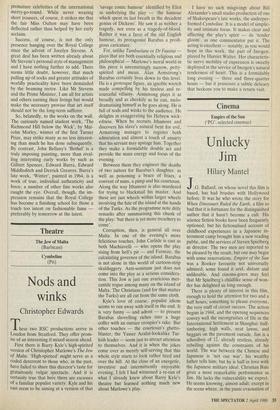Theatre
The Jew of Malta (Barbican) Cymbeline (Pit)
Nods and winks
Christopher Edwards
hese two RSC productions arrive in London from Stratford. They offer prom- ise of an interesting if mixed season ahead.
First there is Barry Kyle's high-spirited version of Christopher Marlowe's The Jew of Malta. 'High-spirited' might serve as a coded deterrent to those who, in the past, have failed to share this director's taste for gratuitously vulgar spectacle. And it is certainly true that here there are excesses of a familiar populist variety. Kyle and his cast seem to be aiming at a version of that
`savage comic humour' identified by Eliot as underlying the play — 'the humour which spent its last breath in the decadent genius of Dickens'. He saw it as neither a tragedy, nor even as a tragedy-of-blood. Rather it was a farce of the old English humour, its protagonist Barabas a prodi- gious caricature.
For, unlike Tamburlane or Dr Faustus plays that are both essentially religious and philosophical — Marlowe's moral world in this piece is unremittingly narrow, petty- spirited and mean. Alan Armstrong's Barabas certainly lives down to this level. He is a grotesque figure, an ignoble wretch made compelling by his tireless and re- sourceful villainy. Armstrong plays it as broadly and as cheekily as he can, melo- dramatising himself as he goes along. He is full of nods and winks to the audience. He delights in exaggerating his Hebrew wick- edness. When he recruits Ithamore and discovers his slave's natural bent for evil, Armstrong manages to register both admiration and almost a touch of anxiety that his servant may upstage him. Together they make a formidable double act and provide the main energy and focus of the evening.
Between them they engineer the deaths of two suitors for Barabas's daughter, as well as poisoning a brace of friars, a convent of nuns, a pimp and his courtesan. Along the way Ithamore is also murdered for trying to blackmail his master. And these are just wheels within larger wheels involving the fate of the island at the hands of the Turks. As the programme note drily remarks after summarising this chunk of the play: 'but there is yet more treachery to come'.
Corruption, then, is general all over Malta. In one of the evening's more felicitious touches, John Carlisle is cast as both Machiavelli — who opens the play rising from hell's pit — and Farneze, the calculating governor of the island. Barabas is not alone in this world of cartoon-strip skulduggery. Anti-semitism just does not come into the play as a serious considera- tion. This Jew is just one avaricious mer- cantile rogue among many on the island of Malta. The Christians (and for that matter the Turks) are all cut from the same cloth.
Kyle's love of coarse, populist idiom seems to run away with itself in the end. It is very funny -- and adroit — to present Barabas shovelling riches into a huge coffer with an outsize croupier's rake. But other touches — the courtesan's ghetto- blaster, the Yasser Arafat-lookalike Tur- kish leader — seem just to attract attention to themselves. And it is when the jokes come over as merely self-serving that this whole style starts to look rather tired and over the hill. At the close of an energetic, inventive and intermittently enjoyable evening, I felt I had witnessed a re-run of what I already knew about Barry Kyle's theatre but learned nothing much new about Marlowe's play.
I have no such misgivings about Bill Alexander's small studio production of one of Shakespeare's late works, the underper- formed Cymbeline. It is a model of simplic- ity and intimate focus. It makes clear and affecting the play's spirit — its 'tender gloom', as one commentator put it. The acting is excellent — notably, as you would hope in this work, the part of Imogen, played by Harriet Walter. Her characteris- tic nervy mobility of expression is sweetly deployed in the service of Imogen's natural tenderness of heart. This is a formidably long evening — three and three-quarter hours — but it possesses a subtle delicacy that beckons you to make a return visit.


















































 Previous page
Previous page